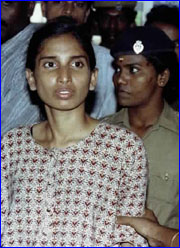Ilankai Tamil Sangam29th Year on the Web Association of Tamils of Sri Lanka in the USA |
||||
 Home Home Archives Archives |
Why George Bush Cannot Match Sonia Gandhiby M.R. Narayan Swamy, Indiaenews.com, January 1, 2007
George W. Bush finally had his revenge as he slept through the judicial murder of Saddam Hussein, who had famously celebrated with gunshots when Papa Bush's term as US president ended without securing the Iraqi strongman's ouster. Once Bush junior decided that all was fair in war, lies about WMDs included, Saddam stood no chance. He paid with his throne in 2003 and his neck three years later, hanged to death in the same manner he himself presided over so many executions during the quarter century he ruled Iraq, first as a darling of Washington and then as a resolute foe.
Had Kurds or Shias dragged out Saddam and done him to death, it could have been explained as an act of vengeance by communities whose members he tortured and killed. But even making allowances for the Internet age, they may not have filmed Saddam's execution for the world to see. Only those who humiliated a once proud Arab nation by capturing on movie a petty soldier examining Saddam's dentures could have thought of the ultimate insult. That Saddam died without any visible expression of fear, refusing to don the death veil (even as all his executioners hid their identity by securely covering their faces with black masks), may only end up further tormenting a military whose occupation of Iraq is by all accounts coming to an inglorious end. And the fact that Saddam was put to death hours before Muslims celebrate Eid was the ultimate humiliation of a religious community that is today undergoing an unprecedented sense of persecution, both real and perceived. Far away, in a country that is home to the world's second largest Islamic population but nevertheless overwhelmingly Hindu, there was widespread revulsion over Saddam's killing. It wasn't because the man on the street in India loved Saddam or his ways. But because people felt it was in poor taste to first have a man convicted with a court whose credibility was in doubt - and then film his last moments. How different were Saddam's executioners from those of Al Qaeda? What has gone unnoticed is the resolve of one individual in India, completely unlike George Bush, to draw a clear line between a personal tragedy, a far more serious one at that, and the affairs of the state as well as the welfare of a people. Sonia Gandhi has acted like a statesman when it comes to Sri Lanka, not letting the assassination of her husband Rajiv Gandhi at the hands of a Tamil suicide bomber cloud her concern for the island's beleaguered Tamil community. Rajiv Gandhi's grotesque killing in 1991 shattered Sonia, who married him over 20 years earlier, like nothing else. Refusing to be enticed by the office of prime minister offered to her on a platter after his death, she kept away from limelight for years before taking to politics from the very spot where the man she loved was blown up. Even that January 1998, no one dreamt that she would one day lead a moribund Congress to a remarkable electoral win and again say no to the country's top job. But much before that, one of Sonia Gandhi's finest gestures was to plead for the clemency of a young Indian Tamil woman who was part of the conspiracy that extinguished her husband. She corresponded with Nalini, who had become a mother in prison, and saw to it that her death sentence was commuted. And she did this quietly, without media glare, and never bragged about it. When the Congress took power in May 2004, many Sri Lankans thought she would go for revenge against the Tamil Tigers for her husband's death. Far from it, Sonia Gandhi has displayed tremendous courage and political maturity to make peace in Tamil Nadu with those who were once and still aligned with the Tigers. No Sri Lankan who has met Sonia Gandhi has left with the impression that she has revenge in mind, although the subject of Rajiv Gandhi's killing, if ever mentioned, draws dark shadows on her face. As the head of India's ruling coalition, she has consistently pleaded for a just settlement of Sri Lanka's ethnic conflict in a manner the Tamils feel justice has been done to them. It would perhaps be too much to expect Bush to match up to Sonia Gandhi. After all it was he who presided over a crippling UN sanction that killed thousands of innocent Iraqis, children included, for no fault of theirs except that Saddam was their master. Can one who oversees children die en masse, one who has so savagely decimated Iraq, feel remorseful over the revenge killing of Saddam? (M.R. Narayan Swamy is Deputy Editor at IANS. The views expressed are personal. He can reached at narayan.swamy@ians.in)
| |||
